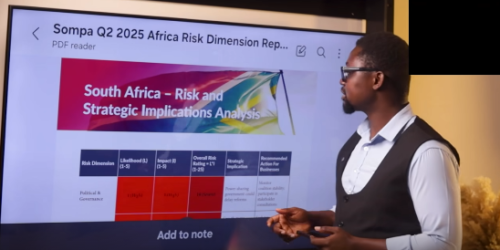South Africa’s reputation as sub-Saharan Africa’s most sophisticated market is being challenged by a trio of persistent operational headaches—unreliable electricity, elevated crime rates, and intense social expectations around transformation—that are forcing investors to fundamentally rethink how they plan and execute business strategies in the country.
A new analysis from Sompa & Partners frames these challenges within a seven-dimension risk framework that goes beyond traditional financial and regulatory assessments. Yaw Sompa, the firm’s analyst, argues that the country’s institutional complexity demands companies consider energy resilience, crime mitigation, and community engagement as core strategic elements rather than peripheral concerns.
The energy situation remains perhaps the most tangible operational constraint. Load shedding returned at the end of January 2025 after a brief respite, and South Africa experienced power cuts for the first time in more than 10 months over a weekend in late January. What began as an intermittent nuisance has evolved into what Sompa describes as a structural constraint on productivity—one that affects manufacturing, logistics, and information technology sectors with particular severity.
For businesses operating in South Africa, power instability translates directly into higher costs, lost output, and increasingly complex supply-chain planning. The challenge isn’t simply managing occasional disruptions; it’s building entire operational models around the assumption of unreliable electricity supply.
Security concerns compound the difficulty. Sompa referenced a May 27 United States government travel notice that warned violent crimes including robbery, rape, carjacking, and smash-and-grab incidents remain common across South Africa. Beyond immediate threats to staff and assets, pervasive crime erodes trust, raises insurance premiums, and can damage both employee morale and stakeholder confidence.
Unemployment reached 33.2 percent in the second quarter of 2025, up from 32.9 percent in the first quarter. That persistent joblessness, combined with deep inequality, amplifies social tensions that businesses must navigate carefully. Companies face explicit expectations for local hiring, community investment, and meaningful transformation—expectations rooted in South Africa’s complex socio-historical context.
The Sompa & Partners analysis emphasizes that corporate actions in South Africa are viewed through a distinctly historical lens. Projects touching land, labor, or natural resources that ignore what Sompa calls the “social contract” risk costly protests, reputational damage, and regulatory scrutiny. Token corporate social responsibility efforts, the report warns, no longer suffice; tangible community transformation has become a business requirement.
Environmental risks add another layer of complexity. Sompa describes South Africa as a climate change hotspot, pointing to tragic recent events like June floods in the Eastern Cape that killed at least 49 people, including schoolchildren. These shocks have direct operational impacts while shaping local perceptions of investor responsibility.
The firm translates these risk factors into practical guidance: prioritize transparency and inclusive stakeholder engagement early and frequently; design operational redundancy through dual suppliers, backup power, and decentralized production where feasible; integrate environmental, social, and governance considerations into core strategy rather than treating them as add-ons; adapt leadership styles to balance crisis management with consultative diplomacy; and factor security costs and contingency planning comprehensively into financial models.
Despite these headwinds, Sompa stresses South Africa retains significant advantages—deep capital markets, advanced telecommunications and financial services infrastructure, and a large, diversified domestic market. For investors willing to invest in resilience across operational, social, and environmental dimensions, the market remains rewarding.
Recent police statistics show notable drops in major violent crimes, with murder levels decreasing 12.4% and aggravated robbery dropping 10.4% when comparing January-March 2025 with the same quarter in 2024. And Eskom recently announced that Unit 6 of Kusile Power Station entered commercial operation, unlocking the full 9,600MW capacity—potentially a significant step toward more reliable electricity supply.
The broader question is whether improvements in infrastructure and security will materialize quickly enough to prevent businesses from writing off South Africa as too operationally complex. The country’s advantages remain real, but so do its constraints. Success, according to Sompa & Partners, requires treating risk not as something to be minimized but as strategic capital—investing in redundancy, social license, and local integration as fundamental elements of any market entry or expansion plan.
For companies eyeing South Africa, the calculus has shifted. The market still offers scale and sophistication unmatched elsewhere in the region, but accessing those benefits now demands significantly more sophisticated risk management than a decade ago. Those who approach South Africa with eyes wide open to both opportunity and operational reality may still find it rewarding. Those expecting straightforward market access are likely to be disappointed.
Source: newsghana.com.gh











